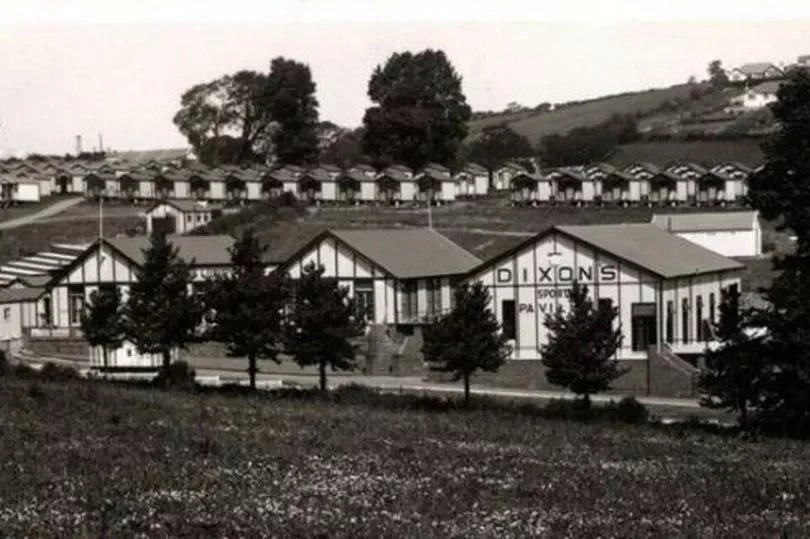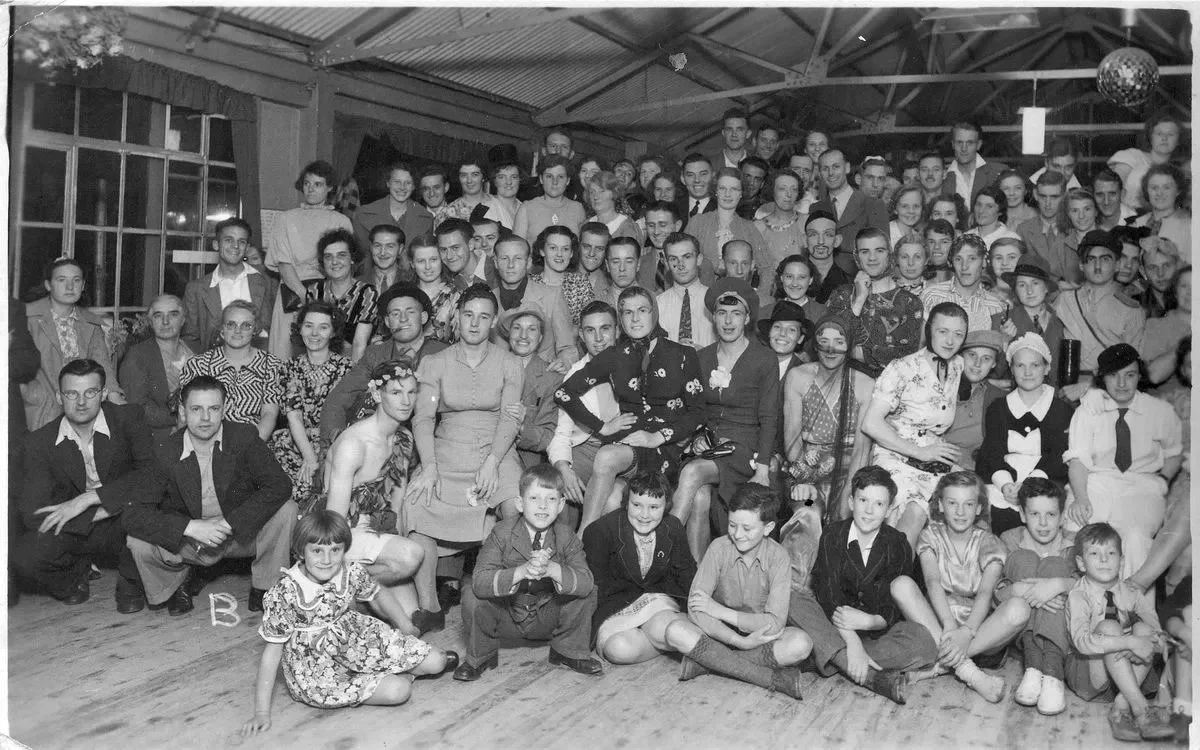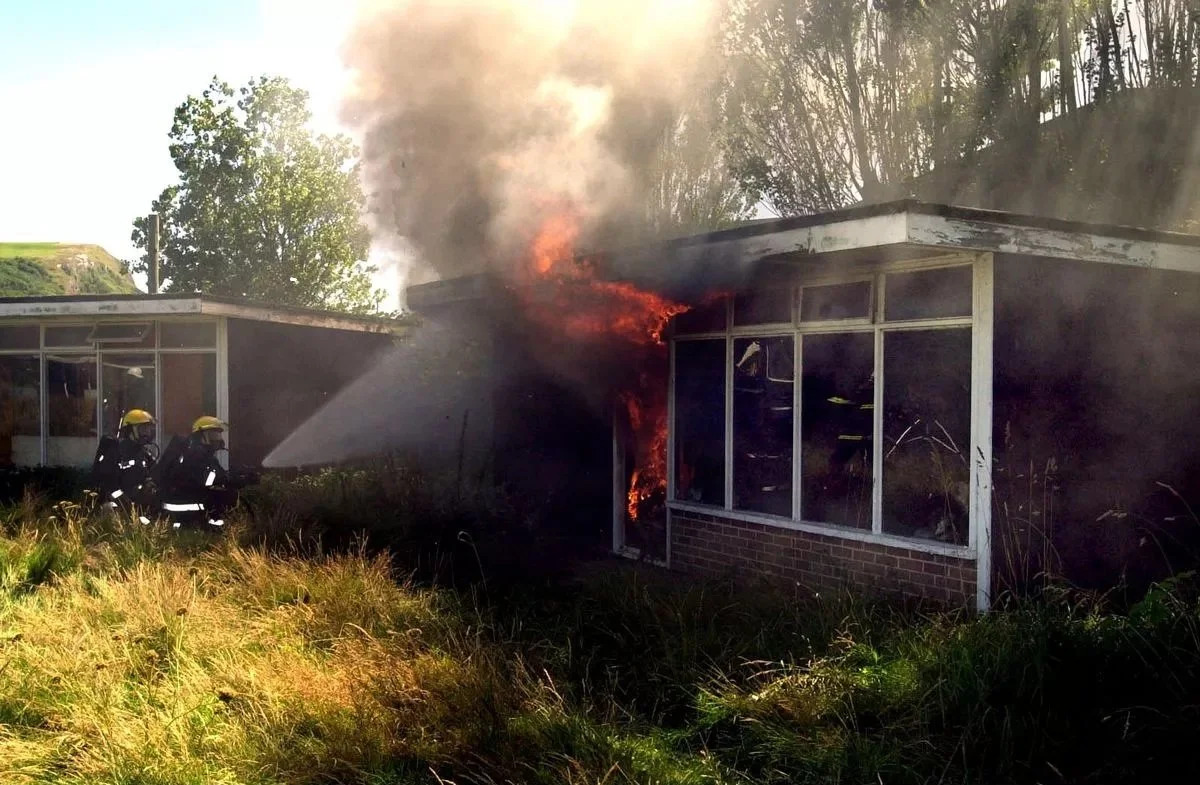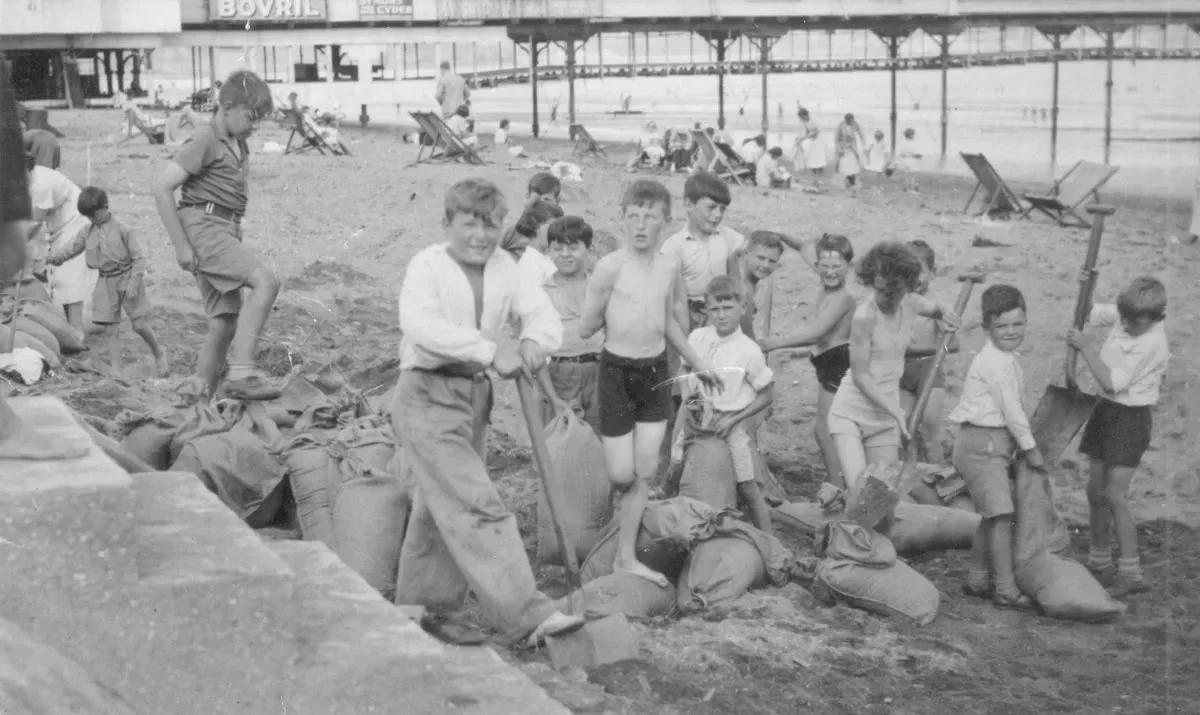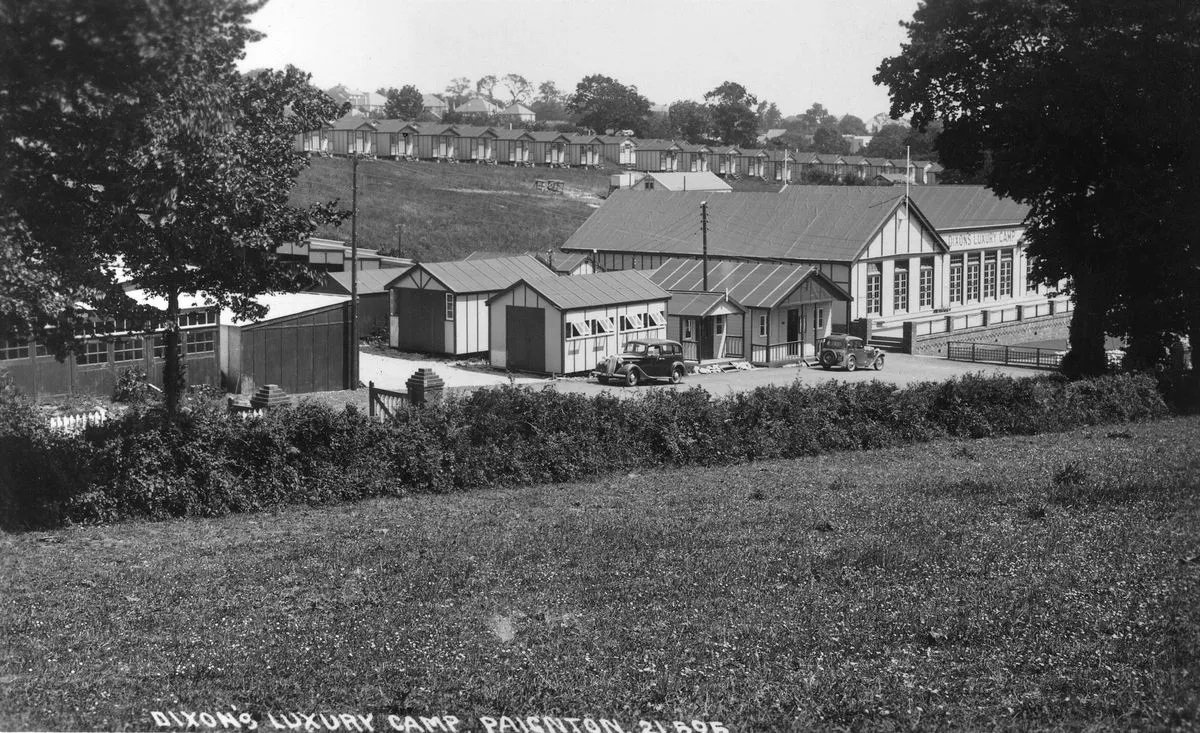
Devon’s War time Holiday Parks
Not many people know that in the first few weeks of the Second World War, two Devon holiday camps were requisitioned by the British government and were used to intern 'enemy aliens' - German and Austrian men living in this country who were thought to be dangerous.
War was declared in September 1939 and by October there were three internment camps opened in the UK. They were the Warner's holiday camp at Seaton and Dixon's at Kings Ash in Paignton, later Pontin's Devon Coast Holidays. The third was in Clacton, later to become one of Billy Butlin's holiday parks.
Dixon's "luxury" holiday camp in Paignton cost internees 4s 6d a day
The internees at Seaton have described the terrible conditions. One said: "Huts were unbearably cold and there was a lack of food. I have never been so hungry in my life."
It wasn't all bad though. A great addition to the camp was the arrival of a complete music band from a German cruise liner scuttled in the Atlantic Ocean.
In contrast Paignton was the 'luxury' camp where the 'very, very wealthy' detainees paid 4s 6d per day for heating and to be waited on.
The two Devon former internment camps have long since disappeared to make way for housing estates.
Devon historian Dr Rachel Pistol is looking into the fascinating story and the tragedy of the 841 lives lost when the internees were torpedoed and drowned as they were being shipped abroad. Many of the men who were locked up were just ordinary citizens who had lived happily in Britain with their families before the outbreak of war.
Many of those who died when the SS Arandora Star was sunk were Italians who had run pizza cafés, restaurants and ice cream parlours before the war.
Dr Pistol said: "By far the lowest survival rate were the Italians because there was no exit point from the lower decks and the ship was covered in barbed wite.
"German prisoners of war were treated the best because they they had rights which were respected by the British military men. The Italians had been restaurateurs and ran ice cream parlours before the war.
"Also they were by far the biggest group and the lower decks had the most space."
The deportation of Putzi (Hitlers friend and right hand man in the early years)
As far as the authorities were concerned, incarceration of aliens was a distinct improvement on leaving them free to wander around Britain, were Would be in they would be in a position to commit acts of sabotage. But it was feared that even those in camps could be liberated by advancing German troops and serve as a fifth column. A decision was therefore taken by the War Cabinet to select some 7500 of the most potentially dangerous men and export them out of harm's way to Australia and Canada.
Putzie, Along with the internees of the two Devon camps was chosen to be deported to Australia and Canada. He set off from Liverpool on June the 20th aboard the Duchess of York, the first of three ships due to sail within a few days of each other. As with the previous moves, the internees had been kept completely in the dark as to where they were going. It was only when their train arrived in the port of Liverpool and they caught sight of the ship that they realised they would be crossing the Atlantic.
Crossing had little in common with Putzie’s previous transatlantic voyages.Conditions on board the Duchess of York were miserable. The ship was carrying 2500 internees, more than twice her normal capacity. The journey provided Putzie with ample opportunity to ponder the dramatic slump in his fortunes. After eight days at sea, the ship made it safely to Quebec.T hose internees on board the second vessel, the Arandora star, also bound for Canada, were not so fortunate. On July the Second, a day after leaving Liverpool, the vessel was torpedoed and sunk by a German U boat off the West Coast of Ireland. Some 682 of the 1571 German and Italian refugees on board lost their lives.
Excerpt from, Ernst Hanfstaengl, Hitler's Piano Player, A book by Peter Conradi, 2005.
The Arandora Star tragedy, BBC News.
Other internees were put into the 'dangerous' category just because they had unpopular political opinions - including many trade unionists.
One of the problems with the camps was that Jewish men were locked up alongside Fascists.
In a fascinating insight, an uneasy truce was established at Seaton only once the camp had divided itself - the pro-Fascists lived on one side of the swimming pool and on the other side it was the anti-Fascists or Communists - there were tents in between for those who didn't fit into either camp.
Dr Pistol has unearthed quotes (below) from some of the internees who described life inside the barbed wire walls. They talk about making pocket money by repairing fishermen's nets.
Dr Pistol - author or 'Internment during the Second World War' - is a research fellow at Kings College and an honorary research fellow at Exeter University. She said that even in the history community there is little known about these camps: "It's quite an interesting story. Since moving to Devon I have discovered that two of the three original internment camps at the start of the Second World War in the UK were in Devon. The other one was in Clacton.
"At the start of the war they only locked up a few people who they thought were the most dangerous - either because they were very pro-Facist, pro-Communist or Trade Unionist were locked up as well.
"Those places were chosen just because we had holiday camps available and because of the speed at which they needed to arrest some of these enemy aliens.
"This was in October 1939. They surrounded them with barbed wire and they were guarded by the local Territorial Army volunteers.
"When war was declared there was an understanding the German and Austrian men who were refugees would go before tribunals and they were graded according to how dangerous they were judged. The camps were for pro-Fascists, pro-Communists and Trade Unionists who were thought to be most dangerous.
"One of the biggest problems was that Jewish refugees were locked up with the Fascists”.
The Seaton camp was divided - Facists on one side of the pool and Communists on the other
"In Seaton an uneasy peace was found after the pro-Fascists stayed on one side of the swimming pool and on the other side it was the anti-Fascists or Communists - there were tents in between for those who weren't sure."
One of the internees said afterwards: "The two Western rows of huts contain Nazis and Nazi sympathizers, the Eastern rows refugees of racial and political origin - with tents in between for people not joining either side."
The internment camps did not last long. After France, Belgium and Holland fell in May 1940 fear spread and it was decided it would be best to lock up ALL German and Austrian men to be on the safe side. That was when they were shipped abroad because of fears that they would join the enemy if Britain also fell to the enemy invaders.
Campers and staff at Pontin's Holiday Camp, Kings Ash, Paignton, on August 25 1938, prior to a Saturday night dance.
The other interesting detail that has emerged about the two camps was that there were around 100 people at the Paignton Dixon's camp because of the high cost for staying in relative 'luxury' with heating and waiter service and 650 at Warner's in Seaton.
The camps were always meant to be temporary. They were wound up by July 1940 and internees were sent to various camps around the UK and then on to the Isle of Man once it was ready.
Tragically some internees were transported aboard - they were being shipped to Canada and Australia - and hundreds died aboard the torpedoed SS Arandora Star which was torpedoed and sunk on July 2 1940. In the sinking 841 people died (486 were Italian, 175 were German internees, 52 were prisoners of war from Germany, 37 were guards and 55 were crew members). There were 832 survivors.
SS Arandora Star
Dr Pistol said: "Pictures of the old camps are very hard to find. I would be very interested to hear from people about what they remember.
"The history of these holiday camps is something that even in the history community it is least explored."
But despite that she has dug up these fascinating quotes from prisoners and is appealing to the people of Devon who may have memories or photographs.
Internees at the Seaton camp
Ludwig Baruch
A Trade Unionist who got blacklisted as 'a soviet agent and agitator': 'Camp quite large and well equipped but soldiers unaware of what type of prisoner was in camp. Huts were unbearably cold and lack of food. 'I have never been so hungry in my life. It was an outrageous breach of the 1929 [Geneva] convention and in spite of continuous protests, and most likely also from outside, the position was never tolerable. It was rumoured that the food for the internees was stolen and sold on the black market. Possible, in view of later experience of dishonesty in the British army, but impossible to prove.' - Communists in Seaton were very influential in camp and that kept the Nazi minority from gaining leadership in Seaton -The authorities supposedly refused to separate Nazis from anti-Nazis because 'they would have admitted the utter folly of their blanket internment policy.'
Erwin FrenkelHerr Frenkel was classified as 'A' - dangerous. He was taken direct to Piccadilly Circus Police Station, then to Chelsea transition centre, and then to Seaton.
He said: "It was surrounded by barbed wire but, except for two roll calls daily, there was no restriction on liberty inside the camp. We were given the opportunity to earn some pocket money by making fishermen's nets.... "
Rainer Radok
"The camp is an extended rectangular compound which in the past has served as a low class seaside holiday camp: Two double rows of tiny plywood huts, a swimming pool, tennis courts and a football field occupying the space in between.
"Two barbed wire fences, added to the holiday scheme, surround this arrangement with a gangway in between for the guards. The industrial-type building facing the main road into town contains mess facilities, kitchen, camp office, a theatre with stage and a canteen. The sea, on the other side of the road, can be heard occasionally. When there is a real storm, the sea crosses the road and inundates the camp. This is to happen several times during the Winter, when cold conditions lead to formation of ice on all footpaths.
"The two Western rows of huts contain Nazis and Nazi sympathizers, the Eastern rows refugees of racial and political origin with tents in between for people not joining either side.
"The camp organizes itself quickly. Soon it is possible to have shoes and clothes repaired and small carpentry jobs undertaken.
"Especially popular become visits to the dentist in town. It is said that for cash one can obtain there other than dental attention.
"There is a real lack of heating; people are forced to crowd into the dining hall where three gun stoves, stoked with briquettes, provide minimal warmth.
"A great addition to the potential of the camp is the arrival of a complete music band from a German cruise liner scuttled in the Atlantic Ocean.
"The huts...are not designed even for the standard English Winter. This winter is by no means a standard winter. Ice and snow last for many months. After some protests, tiny heating coils are installed in the small plywood huts without insulation, each of which sleeps three people.
"There are not enough blankets and all clothing is worn at all times. At night, pyjamas are quickly placed underneath the day time clothes before one slips into a carefully prepared, but improvised sleeping bag on a straw-filled palliasse.
"When, after installation of the mini-heaters, the first electricity bill reaches the camp, the inventiveness of the prisoners manifests itself. It is a miracle that no major fires occur during the Winter. From then on, the soldiers search almost daily the huts for improved heating elements, but that battle is never won and the electricity bill never drops to the scheduled level.
"Those internees who acknowledge allegiance to Germany are supplied by the Red Cross with a little pocket money, smokes and necessities. Parcels from outside begin to play a major role.'
"Many internees on the East side volunteer for making camouflage nets. We are paid per net and make sufficient money to purchase basic needs at the canteen."
Neither of the Devon camps exisits today, here is the fire brigade using Seaton camp for fire fighting training.
Children digging for victory on the day war broke out in Paignton
Paignton Pier during the World War Two
Paignton
Eugen Spier said: "For those who wished to avail themselves of a more luxurious life with better sleeping and feeding accommodation and service with personal attendance for an extra payment of 4s. 6d. per day, a special Camp was installed at Paignton in Devonshire.
"Only a very limited number of internees chose to take advantage of these facilities to become paying guests and the bulk of the Camp travelled to Seaton."
Dixon's later became the Pontin's Devon Coast Holiday Park until it was bulldozed to make way for a housing estate in the late 1980s off Kings Ash Hill.
In Seaton the former Warner's holiday camp has also been flattened to make way for a housing estate and a Tesco supermarket.
Dr Pistol said: "The Dixon's camp at Paignton was the luxury camp. If you could afford it you could pay to go there. It was 4s 6d a day in order to have you own space and heating and they were waited on. That was an awful lot of money at the time and you had to be very, very wealthy. Some people spent all the money they had just maintaining themselves in the camp - and then when they ran out of money they were moved from Paignton to Seaton."
"If you couldn't afford it you would go to Seaton. It was basic with no heating and not enough space.
"Some of them ran out of money at Dixon's and they were sent to Seaton."
Paignton: Clearing the chalets to make way for housing in 1989
